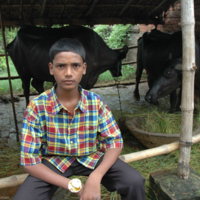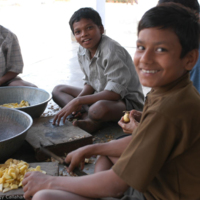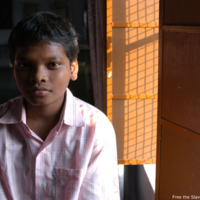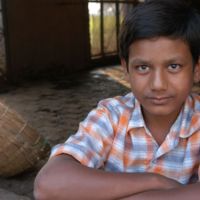
My name is Rambho Kumar and I am 11 years old. I used to work at home and I also used to play and roam around with the kids living nearby. A man named Shankar and the owner of the loom came one day to my house and gave 700 rupees [$15] for me. They told my parents that they’re going to educate me and make me do some work. I didn’t want to go to the looms. I wanted to stay at home. But there was no money at home for us to eat so my mother told me to go. I was crying and saying that I didn’t want to go there. They said that they’re going to give me money. He’ll send money home and then after some time I can come back. But after a very long time he told me that I’m not going to be able to go back home ever.
After two days I reached the loom and they made me sit. They told me to learn how to use the loom. My hand got cut and the owner and his brother shut my eyes and put my finger in boiling oil and said: “Now it’s all right, now you get back to work.” If I made any mistake, the loom owner used to take a stick and beat me with that. I kept asking the loom owner when I would go to school, and he kept telling me: “There is no school for you. You will spend time weaving carpets.”
I used to work from four in the morning till 11 in the night. I wasn’t allowed to play or roam around or anything. At about ten in the morning we used to get our first meal which was not good, and then I would go back to weaving the carpets till about ten at night. And that was all we did during the day: weaving carpets, eating food, and going to sleep. I was there for one year. I wanted to go back home. I always used to want to get away. The owner used to tell us: “If the police ever come, run away before they can catch you.” So I knew that when the police came I’d be taken away from there. When I saw them coming I was very happy. As soon as they came, the owner and his father and his brother and all the other people ran away. About ten of us were surrounded by the police. Six of us ran away but four of us were brought to the Ashram. When I came here I liked it because you get time to eat, you get time to play, to study. I like studying the most.
I haven’t seen my mother for the last 13 months and I miss my family a lot. My father has passed away. We put 6000 rupees [$130] into expenses for his treatment but still he passed away. Now we don’t even have a place to stay over there in the village. I want to help my mother find a house. I want to go to my village and be a guard there, and I think I’ll be able to study and earn money. And I won’t let anybody go to the looms even by mistake. I’ll tell them: “They hit you and they beat you.” I would not let them go there, ever. If the children make any mistakes they beat them up. I won’t let them go there.
Narrative as told to Peggy Callahan for Free the Slaves, August 19, 2004, at Bal Vikas Ashram, in Allahabad, Uttar Pradesh, India.


